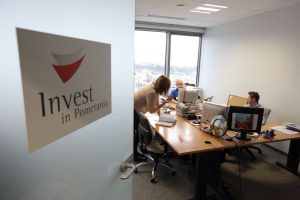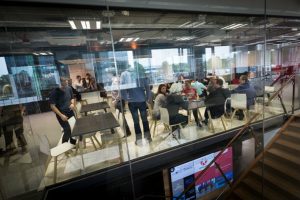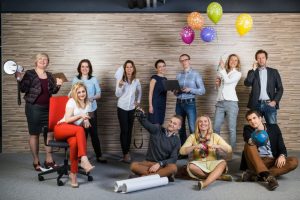About the search for investors, unnecessary competition in the Tri-City and about why it is worth staying in Gdańsk after graduation and learn foreign languages – we talk to Jake Jephcott, an Englishman living in the Tri-City for 15 years, the Business Development Director in the Olivia Business Centre.
This interview was originally published on Gdańsk.pl site.
Izabela Biała: Joint and business service centres conquered the Tri-City office market last year. The year 2016 will probably belong to Scandinavian firms. You mentioned during one of the industry conferences that the presence of Scandinavian experts on the spot is material for this trend. These philologies have always been taught at the Gdańsk University. What is the reason for their recent particular importance?
Jake Jephcott: “This is mostly the matter of a good accessibility of the market. Only a few years ago, Scandinavian firms did not take Poland into account as a place for business development. I have many friends who emigrated to Sweden or Norway 20 years ago as graduates from the said philologies; they return to Poland now to work here for their local employers.
Gdańsk as the closest neighbour that can be visited by plane in just one hour is a natural choice for Swedish, Finnish or Norwegian companies. What is more, our current offer of offices for rent in Gdańsk is much better than before. Finnish concerns of Kemira, Metsa, Avaus Marketing Innovations and, e.g. the Norwegian Schibsted Group, that have established their centres in Gdańsk in the last two years, appreciated that fact.
Thanks to agencies such as “Invest in Pomerania” the awareness of development possibilities in our region is on the increase among firms on the other side of the Baltic Sea. Scandinavia is very important for us: both for Gdańsk and the region and for the Olivia Business Centre. The Scandinavian-Polish Chamber of Commerce is a partner of our activities and we hope to attract more investors together. Thanks to the information provided by the Chamber and to our own contacts we learn more and more about the market needs of our neighbours.
However, an interesting thing is that it was not Gdańsk but Cracow that paved the way for Scandinavian investments in Poland. The capital of the Małopolska is now famous worldwide for its comfortable offices. The rest of Poland, including Gdańsk, takes advantage of that fame.
Obviously, the Swedes or Norwegians look for people who speak their languages and the possibility to acquire workers with this skill locally is an important asset. One can say that Scandinavian philologies are to the advantage of the entire metropolis. 30 languages are used in the Thomson Reuters in Gdynia and the graduates can find employment there as well.
Foreign languages are more and more important and, as I have observed recently, English only is not enough. Languages skills have always been a passport to the world but it seems to me now that a career can be started even with very good language skills only.”
Why?
“Many processes currently used by firms can be learnt at work. Of course, it is good to know the accounting but the employer can safely teach its workers their future tasks for a few months. However, it takes a few years to learn a language, which makes it the most valuable competence expected of a candidate. We also propagate this information among students as a part of the “Olivia Campus” project.”
The opening of the ThyssenKrupp Global Shared Service Centre Office in Olivia Six. Even one thousand people will be able to work here eventually.
At one of the meetings of that project, you told students that they should not hurry and go out of Gdańsk because many development possibilities await them here. Are these words addressed to everyone or mainly to IT students? What about those who study pedagogy or another faculty, equally non-obvious for the business?
“One cannot focus only on the needs of firms searching for IT specialists. It is true that they take the lead now but this is only the top part of employers’ needs. Representatives of other industries will come to us if those who are already here are successful.
Potential employees are very important for an investor; this is why we have been cooperating closely with the Gdańsk University for three years, among other things, on the Olivia Campus project.
We want to make the transfer from studies to the first serious employment easier for young people.
When you are a student, you do not always know how and where to make your first step in the professional life.
Among other things, we prepared presentations for students with managers of firms residing in the OBC concerning the expectations of our employers. They were mentioning languages of course, and also: the personality, passion, determination, the ability to work in a team. All these soft skills are very important and not really that obvious for everyone. Managers look for people who have that “something”, which is not necessarily linked to the direction of studies.
We also organize job fairs for participants in the project. One can submit a CV, have a mock job interview and, as a result, win internship with one of our firms. Six people out of 20 participants in the first edition of the program got full-time jobs after such internships. Their direction of studies was irrelevant.
Students are always welcome for us. They can drop in for lunch in one of our restaurants, stay in a business environment and, perhaps, meet a manager and start a conversation.
We accepted 20 students for the program in the first year and 40 in another year. This year, we had to make a break but everything seems to show that we will invite 60 people in the next academic year. In the meantime, the OBC significantly increased the number of residents and the range of firms and industries will be greater. I recommend taking part in the program, there is everything to gain. You never know what can happen on your path but you have to be open and take an initiative, this is what I keep telling the students.”
As for the cooperation: during your presentation at the last year’s edition of InfoShare, you were talking about the basic problem of the Polish institutions: they cannot share their knowledge and experience. Universities, towns, business incubators, technology parks – everyone organizes their meetings inviting the same speakers to speak on the same topics…
“I was mainly thinking about the IT sector but the purely competitive approach can be seen everywhere in the Tri-City: in technology firms, startups, on the real estate market. If the competition is to be the only stimulus of development it will negatively impact the activities of all parties.
But I do not want to complain, I prefer encouraging others to share by giving a good example.
From a wider perspective the competition on the international office market is so fierce that we cannot afford an internal competition in the Tri-City. Either we sell 30 percent or the entire Tri-City. Many things have changed for the last 15 years that I have been here but still have to learn to use that triple strength to our advantage. It does not matter whether a firm decides to go to Gdynia or Gdańsk; it will be beneficial for everyone.”
The Pomerania Development Agency And the Invest In Pomerania agency moved to the Olivia Business Centre in January 2016
To develop the subject of competition on the real estate market: what is your job and how it relates to the objectives of the said Invest in Pomerania agency or InvestGDA?
“My role is, at the beginning, to “take” and show the Tri-City metropolis in other countries. I take part in many conferences in Europe and worldwide. Before the journey, I plan my strategy: whom I can meet there and how to talk to them. When I am already there, I reach people to whom I want to show the benefits of Tri-City and the Olivia Business Centre as a place for investments.
People I try to reach also include representatives of authorities of other cities. We cooperate with the Global Parliament of Mayors (an organization of mayors and presidents of cities from all parts of the world, the president of Gdańsk also belongs to it – ed.). It is important for us that representatives of cities would visit Gdańsk and also that our representatives go to various places. In this way, we meet people from local authorities and city organizations, which is a possibility for us to see their work and experience that we can potentially use in Gdańsk in the future.
Finally, we reach decision-makers. People in charge of the selection of new locations for a firm who take part in fairs or conferences usually have a task already assigned to open another office somewhere in the world. They are most important people who have to be convinced.
You have mentioned the Invest in Pomerania and InvestGDA. I will repeat it again: we have to cooperate and not to compete. I do not think of the Olivia Business Centre as an institution that is “separated” from these agencies. We have been meeting for a few years, sharing the information and taking up joint tasks. If I can open some door for them I will do it, of course. When I go to a conference in which the representatives of these agencies do not take part, I represent them. It works both ways.
To sum it up: my job is just to be constantly in touch with people and promote Gdańsk as an excellent place to invest in. Our goal at the end of that long road is the reward in the form of another investor for Gdańsk and the Olivia Business Centre.”
Friendly chillout areas for young firms – O4 zone
Let us talk about your current residents; what is the role of startups in the OBC? They are small firms by definition. From the purely financial perspective, the presence of such small “players” in the pool of our customers seems hardly profitable.
“It is worth remembering that the small becomes large in large quantities. There is space for startups and for small and medium enterprises in our O4 zone. The corporations and fledgling firms need each another. Even if there is a great gap between them, it gets increasingly smaller before our eyes. Giants such as Sony, Panasonic and Lufthansa invest their time and money to explore the environment of young firms. They want to be visible in that “second world”, want to be close to be able to establish contacts, find talents and collect fresh ideas. Nowadays, concerns have to rediscover themselves all the time and develop in an increasing number of directions.
And, obviously, the start-up culture is very trendy; many traditional firms change; they “go” slightly to the left, slightly to the right in order to be able to say: “we are no longer a bank; we are a technology company that conducts operations related to finances”. Why? Because they need young, beautiful, talented people willing to work for modern firms. It is another aspect of the changing world of business.
We also participate in it and want to provide a contact platform for these two environments. It is very important for us to have the greatest variety of firms in the same ecosystem. We devote a lot of time and attention to startups. We offer our full support to them: the mentoring, search for investors, advice on foreign expansion. In fact, we guarantee the same program to all our residents.”
How many years will it take to finish the OBC project? With the present 73 thousand square metres of offices, the investment is not even half way yet as your plans include about 100 thousand metres more…
“I cannot answer this question. Our plans are flexible, we adapt to external conditions. We have our own investment area; it is our security but we are observing the movements of the market.
Up till now, we have been delivering one building per year and I hope we will continue to do so. If external events show us that the “flow of investments” continues, that Gdańsk is developing, the migration is positive with more students we will construct another building. For now, the future looks good; the construction is in progress as we can see through the window. We are still designing the details; I can only say that it will be something really unique, comparable with the appearance of Harrison Ford in the latest Star Wars movie, or even better. This is why I like my work!
I have worked in many cities in Europe, lived in all parts of the Tri-City and I live in the Gdańsk old town now. I have been observing continuous progress for more than a decade. I am glad that I am here.”
O4 zone team photo, Jake Jephcott standing as the last one on the right
As you talk about your satisfaction with your job as the OBC business development director, I cannot but ask this question. How was it possible that you left the Royal Shakespeare Company where you have started your professional career and moved to a completely different industry?
“This is true; I am quite far from the theatre now. My career path was rather complicated. I am the best example of how varied one’s professional life can be. I studied theatrical art direction to start to go into the organization of events and music later and I finally landed in the real estate.
The Shakespeare theatre is one of the key employers in Stratford upon Avon where I come from. There are not many other opportunities if you want to stay in that town. Either you find a job in the theatre or in a hotel, or in a pub where I used to work as well. However, I have always liked travels and dreamt about an international career in spite of the strictly theatrical education.
I have been a DJ for a few years after that. I played and, on the other hand, I was organizing events and took care of music production. The Internet and the start-up culture were born at the time of my activity in the electronic music business, which is very close to new technologies. The contact network I developed at that time was evolving from the music industry to the IT; many people I got to know then are serious entrepreneurs in the IT industry today.
I have friends who say: “you wear a suit, really?” I also have friends who say: “have you really been a DJ?” The move from that activity to what I do today was quite seamless. My current position is not strictly related to the real estate, it is rather the business development of various levels. What counts here, in particular, is the network of contacts and the ability to convey one’s idea, make people believe what you do and say, which was also very useful in the music industry, which is a very competitive market. If you sell your event, gather three thousand people at a concert you play you will be able to use the same skills to contribute to the development of a city, region or the OBC.”








